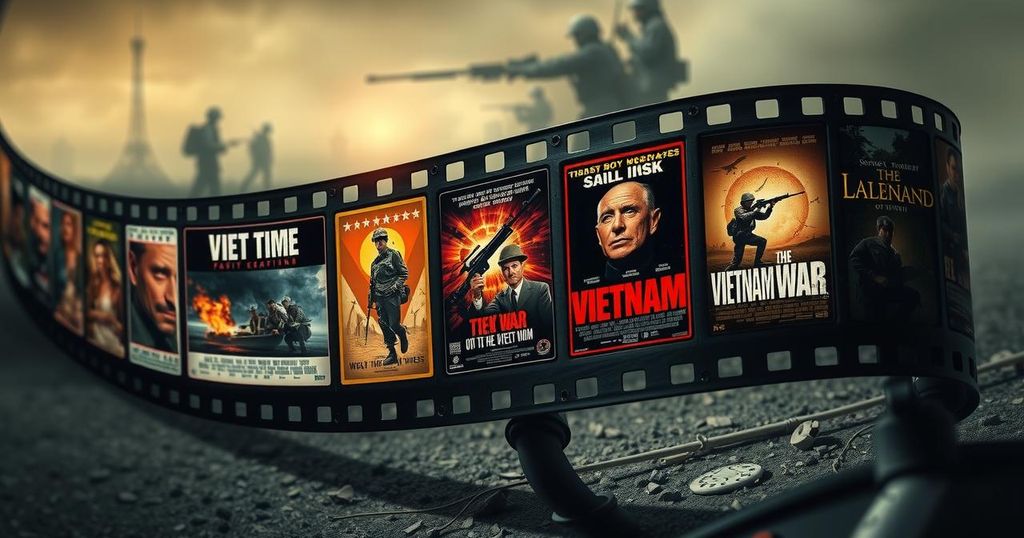Ten Films That Captured the Vietnam War’s Enduring Legacy

This article highlights ten influential films that explore the Vietnam War’s complex legacy, commemorating the 50th anniversary of the fall of Saigon. Featured films range from anti-war classics to poignant Vietnamese narratives, each capturing the lasting trauma of the conflict.
The Vietnam War significantly influenced American cinema, leading filmmakers to engage deeply with its complex legacy. To commemorate the 50th anniversary of the fall of Saigon, this article highlights ten notable films that encompass both anti-war sentiments and Vietnamese narratives of resilience, reflecting the war’s profound and ongoing trauma.
“The Big Shave” (1967) – Directed by Martin Scorsese, this six-minute short film features a man shaving himself, which evolves into a graphic metaphor for the Vietnam conflict. The film illustrates the brutal reality of the war through its striking visual storytelling.
“The Little Girl of Hanoi” (1974) – This landmark film portrays a young girl’s search for family amidst the destruction of Hanoi during the bombings. While it serves as wartime propaganda, it also evokes deep emotional resonance, showcasing humanity within the chaos of conflict.
“Hearts and Minds” (1974) – Peter Davis’ documentary merges newsreel footage with personal accounts to explore the disconnect between American policy and Vietnamese experiences during the war. The film remains a critical commentary on the ramifications of war, reflecting on America’s past decisions.
“The Deer Hunter” (1979) – Michael Cimino’s film is an iconic portrayal of Vietnam, chronicling the transformation of American lives due to war. It deeply resonates with audiences through its exploration of friendship and loss, culminating in a powerful musical scene that underscores the cast’s profound trauma.
“Apocalypse Now” (1979) – This landmark film by Francis Ford Coppola reimagines Joseph Conrad’s “Heart of Darkness.” It explores the horrors of war through a surreal lens, emphasizing the chaos and moral dilemmas faced during the Vietnam War, while also presenting a grand artistic vision.
“Platoon” (1986) – As a hallmark of 1980s cinema on Vietnam, Oliver Stone’s “Platoon” earned the Oscar for Best Picture. Drawing on his personal experiences as a soldier, the film delivers a raw and compelling depiction of the war’s realities and impact on American soldiers.
“Full Metal Jacket” (1987) – Stanley Kubrick’s film offers a critical view of military dehumanization in Vietnam. It starkly contrasts the brutal training of soldiers with urban warfare, creating a harrowing narrative that explores the psychological toll of conflict.
“Little Dieter Needs to Fly” (1997) – Werner Herzog’s documentary tells the captivating story of Dieter Dengler, an American pilot who recounts his tumultuous experience during the Vietnam War. This film delves into the challenges of adapting to life after combat and personal survival against all odds.
“The Fog of War” (2003) – This documentary features former U.S. Defense Secretary Robert S. McNamara discussing the Vietnam War and its complexities. His insights reflect on the rationalizations behind war decisions and highlight the importance of understanding one’s opponent in conflict.
“The Post” (2017) – Directed by Steven Spielberg, this film showcases the role of journalism during the Vietnam War, focusing on the Washington Post’s publication of the Pentagon Papers. It emphasizes the importance of media in holding power accountable, portrayed through the lens of Katharine Graham’s leadership.
For further insights on the Vietnam War’s profound legacy, please visit https://apnews.com/hub/vietnam-war.
In summary, these ten films represent a spectrum of narratives that reflect on the Vietnam War’s complexities. They encompass both American and Vietnamese perspectives, each emphasizing the enduring impact of the conflict on individual lives and societal consciousness. Through their artistic representations, these films contribute to our understanding of the war’s legacy, ensuring that its lessons resonate for future generations.
Original Source: www.ivpressonline.com






